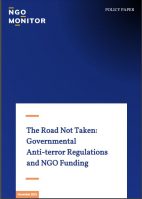The Road Not Taken: Governmental Anti-terror Regulations and NGO Funding
Click Here for Full Policy Paper
Executive Summary
Governmental cooperation with and dependence on non-governmental organizations (NGOs) to implement development aid and engage in humanitarian projects around the world is accompanied by the potential for aid diversion by violent and terror-linked actors.
In the context of funding to Palestinian NGOs, a number of perennial grantees are linked to the Popular Front for the Liberation of Palestine (PFLP) – designated as a terrorist organization by the US, EU, Canada, and Israel. Some are direct PFLP affiliates, while in other groups, numerous officials and board members have been identified as PFLP members – including some who have been arrested and convicted for their involvement in terror. The Israeli Ministry of Defense has designated seven such Palestinian NGOs as terrorist organizations, including six on October 22, 2021.1
As reflected in NGO Monitor research, insufficient vetting mechanisms and regulatory frameworks have allowed at least $200 million in government funds to flow to PFLP-linked NGO projects since 2011. (A severe lack of transparency surrounding funding of Palestinian grantees results in limited information.)
In some instances, government officials involved in funding decisions turned a blind eye to this phenomenon or rejected the evidence. In other cases, officials are aware of the general problem, and employ different policies and regulations to mitigate the threats that these actors pose. However, the responses vary from country to country – each framed by local political and other factors – and the mechanisms are unevenly implemented.
Recent developments illustrate the range of governmental responses to incidents where grantees are shown to be linked to terror groups. For instance, in 2020, the Netherlands at first denied the evidence, then froze funding to a now-designated terror-linked Palestinian NGO, and later hired an external firm to conduct an investigation. Shortly thereafter, the same government directed a similar Palestinian partner to engage in a cover-up by hiding online expressions of support for violence and celebrations of acts of terror by officials.
For their part, Palestinians have reacted to efforts by the donors to add anti-terror regulations with a broad-based campaign to delegitimize these proposed conditions, lobbying the governments to reverse them and pressuring local NGOs to forfeit funding rather than accept language that would prohibit them from engaging with known terrorists. Specifically, in 2020, the PA and Palestinian NGOs launched an intense and aggressive campaign opposing implementation of an EU anti-terror clause in funding contracts.
Similarly, following the designation of six Palestinian NGOs in October 2021, a host of Palestinian bodies denounced the move – including the PFLP.
The EU responses to the Palestinian campaigns have been split, with some diplomats seeking to assuage Palestinian fears and assure them that they will not be adversely affected, while other officials launched investigations.
In parallel, international NGOs affiliated with the Palestinian cause lobby intensively to dilute these restrictions, while promoting a narrative of NGO infallibility. They project images of organizations with pure goals (the NGO “halo effect”), which should be exempt from oversight or restrictions on their activities and in the funding they receive.
While donor governments bear the ultimate responsibility for ensuring the proper use of their funds, Israeli officials must engage with their foreign counterparts on a regular basis, and exchange information and evidence of terrorist activity and affiliations of NGO grantees and staffs.
Recommendations
NGO Monitor recommends that governments consistently implement clear and specific mechanisms to ensure that no resources and support are given to NGOs that are linked to terror or violence.
- Government anti-terror policies with regard to NGO funding must be proactive, with continuous monitoring and analysis of terror financing, as well as radicalizing behavior and rhetoric by NGOs.
- Governments should organize regular staff training sessions in relevant ministries, agencies, and diplomatic missions on misuse of aid, including diversion and fraud. These presentations should include examples of NGO support for violence and affiliation with terrorist groups. This will ensure that professional and diplomatic staff are aware of the current developments and are able to respond.
- In instances where the Israeli government has taken measures restricting NGOs on the basis of terror-related links and activities, or has other information pertaining to such links, the details should be conveyed directly to relevant officials in donor governments.
- Donor governments should adopt the following rigorous vetting practices:
Before the grant period:
- Evaluations must not be limited to determining technical capacity, but must consider all aspects of the potential grantees’ activity, as well as the status and activity of any project partners.
- Governments must not rely only on NGO self-reporting or statements from allied international NGOs. Officials must review publicly available information, including, but not limited to, a grantee’s website and social media accounts, posts by leading officials at the organization, media reports regarding the NGO and its officials, and documentation such as court records and filings with local regulatory bodies.
- Local governments should engage with their counterparts from donor states to inform them of evidence of terror or other violent activity by grantees or their personnel.
- NGOs should submit the names of all employees and board members to allow for background checks to ensure that none is connected to designated terrorist organizations and other violent actors.
During the grant period:
- Governments should establish investigative capacities and procedures, including suspension of funding and cancellation of contracts, when evidence suggests that an NGO is violating grant conditions relating to terrorism and terror financing. Such evaluations must be thorough and independent, cannot rely on NGO self-reporting, and must provide mechanisms for third-party submissions.
- Vetting should also occur at regular intervals during the duration of the grant period.
- Grantees should immediately inform donor governments of the arrests of NGO officials that take place during the grant period.
After the grant period:
- Governments must formulate guidelines for determining when NGOs whose contracts were cancelled over violations of anti-terror regulations become reeligible for future grants.
Footnotes
- The designated groups are Addameer, Al-Haq, Bisan, Defense for Children InternationalPalestine (DCI-P), Union of Agricultural Work Committees (UAWC), and Union of Palestinian Women’s Committees (UPWC). The seventh PFLP-linked NGO, Health Work Committees (HWC), was designated in 2015.



